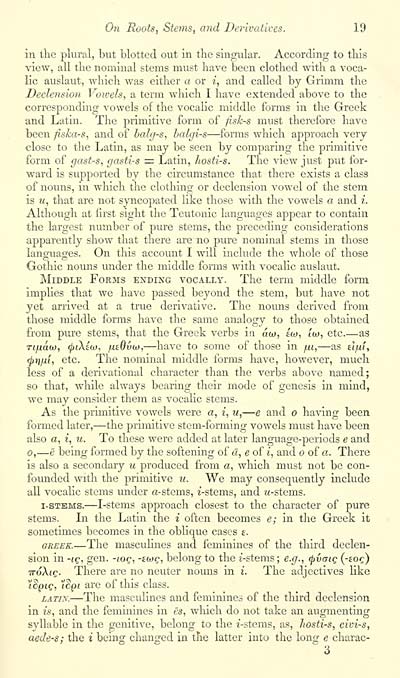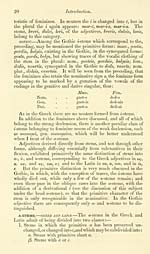Blair Collection > Celtic studies
(49)
Download files
Complete book:
Individual page:
Thumbnail gallery: Grid view | List view

On Roots, Stems, and Derivatives. 19
in the plural, but blotted out in the singular. According to this
Aaew, all the nominal stems must have been clothed with a voca-
lic auslaut, which was either a or i, and called by Grimm the
Declension Vowels, a term which I have extended above to the
corresponding vowels of the vocalic middle forms in the Greek
and Latin. The primitive form of fisk-s must therefore have
been fiska-s, and of halg-s, halgi-s — forms which approach very
close to the Latin, as may be seen by comparing the primitive
form of gast-s, gasti-s =■ Latin, hosti-s. The view just piit for-
ward is supported by the circumstance that there exists a class
of nouns, in which the clothing or declension vowel of the stem
is 7(, that are not syncopated like those with the vowels a and i.
Although at first sight the Teutonic languages appear to contain
the largest number of pure stems, the preceding considerations
apparently show that there are no pure nominal stems in those
languages. On this account I will include the whole of those
Gothic nouns under the middle forms with vocalic auslaut.
IMiDDLE Forms ending vocally. The term middle form
implies that we have passed beyond the stem, but have not
yet arrived at a true derivative. The nouns derived from
those middle forms have the same analogy to those obtained
from pure stems, that the Greek verbs in aw, iio, iw, etc. — as
Tinau), (piXiiio, fieOvu), — have to some of those in fxi, — as elfxt,
(pnjxi, etc. The nominal middle forms have, however, much
less of a derivational character than the verbs above named;
so that, while always bearing their mode of genesis in mind,
we may consider them as vocalic stems.
As the primitive vowels were a, i, u, — e and o having been
formed later, — the primitive stem-forming vowels must have been
also a, i, u. To these were added at later language-periods e and
o, — e being formed by the softening of a, e of i, and o of a. There
is also a secondary u produced from a, which must not be con-
founded with the primitive u. We may consequently include
all vocalic stems under a-stems, z-stems, and w-stems.
I- STEMS. — I-stems approach closest to the character of pure
stems. In the Latin the i often becomes e; in the Greek it
sometimes becomes in the oblique cases e.
GREEK. — The mascuHnes and feminines of the third declen-
sion in -iQ, gen. -loq, -awg, belong to the {-stems ; e.g., (pvaig (-eor)
iroXig. There are no neuter nouns in i. The adjectives like
VSptC, 'Spt are of this class.
LATIN. — The masculines and feminine^ of the third declension
in is, and the feminines in es, wliich do not take an augmenting
syllable in the genitive, belong to the {-stems, as, hosti-s, civi-s,
aede-s; the i being changed in the latter into the lone e charac-
^ 3
in the plural, but blotted out in the singular. According to this
Aaew, all the nominal stems must have been clothed with a voca-
lic auslaut, which was either a or i, and called by Grimm the
Declension Vowels, a term which I have extended above to the
corresponding vowels of the vocalic middle forms in the Greek
and Latin. The primitive form of fisk-s must therefore have
been fiska-s, and of halg-s, halgi-s — forms which approach very
close to the Latin, as may be seen by comparing the primitive
form of gast-s, gasti-s =■ Latin, hosti-s. The view just piit for-
ward is supported by the circumstance that there exists a class
of nouns, in which the clothing or declension vowel of the stem
is 7(, that are not syncopated like those with the vowels a and i.
Although at first sight the Teutonic languages appear to contain
the largest number of pure stems, the preceding considerations
apparently show that there are no pure nominal stems in those
languages. On this account I will include the whole of those
Gothic nouns under the middle forms with vocalic auslaut.
IMiDDLE Forms ending vocally. The term middle form
implies that we have passed beyond the stem, but have not
yet arrived at a true derivative. The nouns derived from
those middle forms have the same analogy to those obtained
from pure stems, that the Greek verbs in aw, iio, iw, etc. — as
Tinau), (piXiiio, fieOvu), — have to some of those in fxi, — as elfxt,
(pnjxi, etc. The nominal middle forms have, however, much
less of a derivational character than the verbs above named;
so that, while always bearing their mode of genesis in mind,
we may consider them as vocalic stems.
As the primitive vowels were a, i, u, — e and o having been
formed later, — the primitive stem-forming vowels must have been
also a, i, u. To these were added at later language-periods e and
o, — e being formed by the softening of a, e of i, and o of a. There
is also a secondary u produced from a, which must not be con-
founded with the primitive u. We may consequently include
all vocalic stems under a-stems, z-stems, and w-stems.
I- STEMS. — I-stems approach closest to the character of pure
stems. In the Latin the i often becomes e; in the Greek it
sometimes becomes in the oblique cases e.
GREEK. — The mascuHnes and feminines of the third declen-
sion in -iQ, gen. -loq, -awg, belong to the {-stems ; e.g., (pvaig (-eor)
iroXig. There are no neuter nouns in i. The adjectives like
VSptC, 'Spt are of this class.
LATIN. — The masculines and feminine^ of the third declension
in is, and the feminines in es, wliich do not take an augmenting
syllable in the genitive, belong to the {-stems, as, hosti-s, civi-s,
aede-s; the i being changed in the latter into the lone e charac-
^ 3
Set display mode to: Large image | Transcription
Images and transcriptions on this page, including medium image downloads, may be used under the Creative Commons Attribution 4.0 International Licence unless otherwise stated. ![]()
| Early Gaelic Book Collections > Blair Collection > Celtic studies > (49) |
|---|
| Permanent URL | https://digital.nls.uk/75771721 |
|---|
| Description | A selection of books from a collection of more than 500 titles, mostly on religious and literary topics. Also includes some material dealing with other Celtic languages and societies. Collection created towards the end of the 19th century by Lady Evelyn Stewart Murray. |
|---|
| Description | Selected items from five 'Special and Named Printed Collections'. Includes books in Gaelic and other Celtic languages, works about the Gaels, their languages, literature, culture and history. |
|---|

